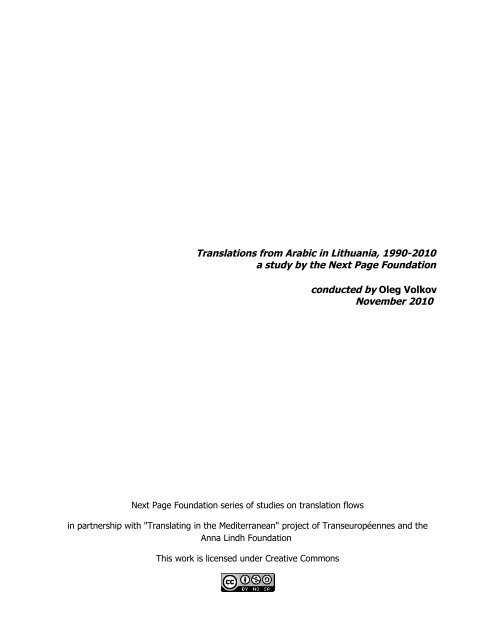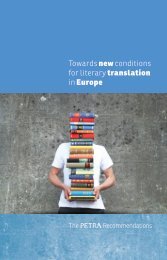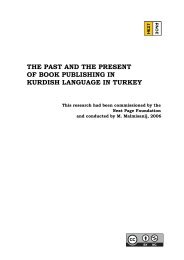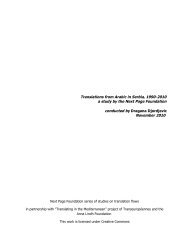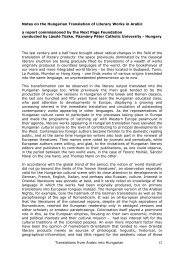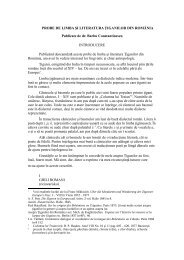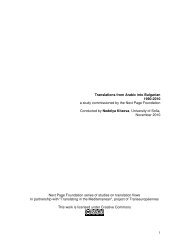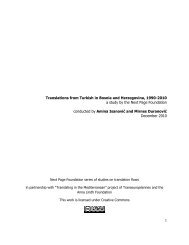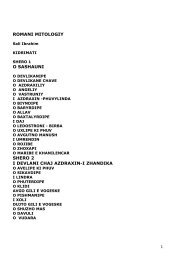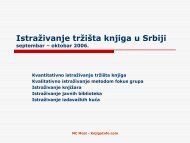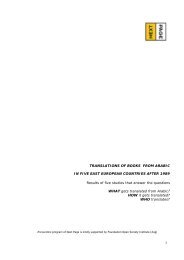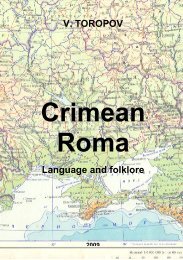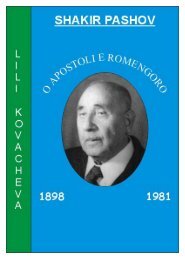Translation activity from Arabic to Bosnian (1989-2010) - Next Page ...
Translation activity from Arabic to Bosnian (1989-2010) - Next Page ...
Translation activity from Arabic to Bosnian (1989-2010) - Next Page ...
You also want an ePaper? Increase the reach of your titles
YUMPU automatically turns print PDFs into web optimized ePapers that Google loves.
<strong>Translation</strong>s <strong>from</strong> <strong>Arabic</strong> in Lithuania, 1990-<strong>2010</strong><br />
a study by the <strong>Next</strong> <strong>Page</strong> Foundation<br />
conducted by Oleg Volkov<br />
November <strong>2010</strong><br />
<strong>Next</strong> <strong>Page</strong> Foundation series of studies on translation flows<br />
in partnership with "Translating in the Mediterranean" project of Transeuropéennes and the<br />
Anna Lindh Foundation<br />
This work is licensed under Creative Commons
Introduction<br />
Today's translation market in Lithuania seems <strong>to</strong> be colorful, as books are being translated <strong>from</strong><br />
almost all European languages. However, the situation with Oriental languages, including<br />
<strong>Arabic</strong>, is different. This is rooted in the lack of transla<strong>to</strong>rs, specializing in Oriental languages,<br />
also in few opportunities of training <strong>to</strong> become a transla<strong>to</strong>r.<br />
The first thing one must know is that no titles were translated in<strong>to</strong> Lithuanian directly <strong>from</strong><br />
<strong>Arabic</strong>. All titles of the <strong>Arabic</strong> literary heritage, which are present now, have been translated<br />
through a third language. The aim of this article is <strong>to</strong> unfold the presence of <strong>Arabic</strong> literature<br />
(both written in <strong>Arabic</strong>, or by Arab authors in other languages) in Lithuanian translations in the<br />
independence era (1990-). A second goal is <strong>to</strong> give an explanation of the current situation.<br />
Publishing and translations market in Lithuania<br />
Lithuania's publishing market has changed radically after the independence. In Soviet Lithuania<br />
the whole publishing area was divided between 6 governmental publishers. The number of<br />
publishers that have published at least one title in 2009 was 547, while a <strong>to</strong>tal of 2108<br />
publishers is registered. The number of titles printed per year has almost doubled <strong>from</strong> 2500 in<br />
the 1980-s <strong>to</strong> the figure of 4500, seen in recent years. The second important difference is the<br />
rapid fall in press runs. In the Soviet era some books could be published in 100,000 copies. The<br />
average print-run in 1990-1992 was still relatively high – 13,000 copies. This number has<br />
decreased over the years, being around 1535 in 2009. These figures do not necessary mean<br />
that Lithuanians read less, as there are several reasons for such a decline. First of all, the<br />
majority of books, published in the early 1990-s, were re-prints. Secondly, the print technology,<br />
left after the fall of of USSR, was much cheaper, although the quality was low, comparing <strong>to</strong><br />
<strong>to</strong>day's standards.<br />
As we can see <strong>from</strong> the first table, the number of books has been rapidly rising in the beginning<br />
of the independence era. The amount of titles published annually was more or less the same in<br />
the last decade. The number has radically decreased by 608 in 2009 due <strong>to</strong> the economical<br />
crisis, which has affected all areas of business in Lithuania, including publishing.<br />
Year 1990 1991 1992 1993 1994 1995 1996 1997 1998 1999<br />
Numbe<br />
r of<br />
titles<br />
issued<br />
2499 2482 2361 2224 2885 3164 3645 3827 4109 4097<br />
Numbe 30255. 34586 30954 19242 19626 14114 14914 14617 13433 12970<br />
2
of<br />
runs<br />
(thousa<br />
nd of<br />
copies)<br />
4 .9 .0 .3 .5 .4 .8 .7 .3 .0<br />
Year 2000 2001 2002 2003 2004 2005 2006 2007 2008 2009<br />
Number<br />
of titles<br />
issued<br />
3709 4402 4859 4559 4226 4223 4548 4567 4580 3972<br />
Number<br />
of runs<br />
(thousan<br />
d of<br />
copies)<br />
11017.<br />
5<br />
10131.<br />
9<br />
8117.<br />
1<br />
8822.<br />
7<br />
7923.<br />
4<br />
7760.<br />
1<br />
8227.<br />
9<br />
8041.<br />
3<br />
7258.<br />
1<br />
6104.<br />
6<br />
1. Books published annually in Lithuania. Source: Lietuvos Spaudos Statistika<br />
If fiction books composed around 25% of published books <strong>from</strong> 1993 <strong>to</strong> 2002, in the later<br />
period fiction constituted approximately 40% of all yearly published books. For example, 1522<br />
belles lettres were published in 2009, which is 38% of the over-all figures.<br />
2004 2005 2006 2007 2008 2009<br />
Titles published 4226 4223 4548 4567 4580 3972<br />
Of which belles<br />
lettres<br />
1153 1304 1545 1675 1686 1522<br />
For adults 765 827 949 1107 1216 1162<br />
Of which originally<br />
Lithuanian<br />
For children and<br />
youth<br />
Of which originally<br />
Lithuanian<br />
473 272 332 553 604 451<br />
388 477 596 568 470 360<br />
199 205 264 248 210 176<br />
3
2. Belles lettres – Lithuanian and translated, published in Lithuania. Source: Lietuvos Spaudos<br />
Statistika 2004-2009<br />
According <strong>to</strong> statistics, one third of books in Lithuanian are translations <strong>from</strong> other languages.<br />
For example, 1171 books, published in 2009, were translations. If the dominating language of<br />
translation in the Soviet Era was Russian, English has taken it's place in the independence<br />
period. More than half of translations are made <strong>from</strong> English, which is followed by German,<br />
Russian and French. A peculiar fact about translations in Lithuania is that the number of copies<br />
of originally Lithuanian books is statistically two times lower than that of translations [in 2009:<br />
1200 vs 2300].<br />
Engl<br />
ish<br />
Ger<br />
man<br />
Rus<br />
sian<br />
Fren<br />
ch<br />
Polis<br />
h<br />
Es<strong>to</strong><br />
nian<br />
Itali<br />
an<br />
Spa<br />
nish<br />
Swe<br />
dish<br />
Nor<br />
weg<br />
ian<br />
Lati<br />
n<br />
Port<br />
ugu<br />
ese<br />
Latv<br />
ian<br />
Dani<br />
sh<br />
Jap<br />
ane<br />
se<br />
Anci<br />
ent<br />
Gre<br />
ek<br />
Finn<br />
ish<br />
Oth<br />
er<br />
689 122 90 69 39 32 26 24 17 11 6 6 5 4 4 4 4 19<br />
3. <strong>Translation</strong>s in<strong>to</strong> Lithuanian in 2009. Source: Lietuvos Spaudos Statistika 2009<br />
<strong>Translation</strong>s of <strong>Arabic</strong> literature in<strong>to</strong> Lithuanian in the Soviet Era (1940-1990)<br />
According <strong>to</strong> the information, provided by the LIBIS system, there was a <strong>to</strong>tal of 24 titles of<br />
<strong>Arabic</strong> literature, published in Soviet Lithuania. All of them were translated <strong>from</strong> Russian or<br />
Polish. Most of the books published were compilations of <strong>Arabic</strong> tales, taken <strong>from</strong> different<br />
Russian and Polish editions of Tales of One Thousand and One Nights. However, several novels<br />
(both of them social) were also published in the Soviet Era, including Medžiai... ir Marzuko<br />
nužudymas (Trees... and the Killing of Marzuq, Al-ashjar wa-ghtyal Marzuq) by Abdul Rahman<br />
Munif and Beirū<strong>to</strong> malūnai (Death in Beirut) by Awwad Tawfiq Yusuf. A compilation of Lebanese<br />
short s<strong>to</strong>ries was translated <strong>from</strong> Russian and published, bearing the name Deimantinės<br />
vestuvės (Diamond Wedding). Two works of Medieval <strong>Arabic</strong> literature (apart <strong>from</strong> children<br />
s<strong>to</strong>ries) were published – Balandės Karoliai (The Ring of the Dove, Ṭawq al-Ḥamāmah) by Ibn<br />
Hazm, and Šykštuolių knyga (Book of Misers or Avarice & the Avaricious, Kitab al-Bukhala) by<br />
Al-Jahiz. Additionally, the book of an Algerian writer Kateb Yacine Nedžma (Nedjma), originally<br />
written in French, was translated directly <strong>from</strong> the original and published in Soviet Lithuania.<br />
<strong>Translation</strong>s of <strong>Arabic</strong> literature in<strong>to</strong> Lithuanian (1990-<strong>2010</strong>)<br />
Religious literature<br />
4
Contrary <strong>to</strong> the prevailing beliefs in Europe, Lithuania has a long his<strong>to</strong>ry of Muslims, living on its<br />
terri<strong>to</strong>ry. First Muslim settlements in Lithuania can be observed in XIII-XIV ages. The rulers of<br />
the Grand Duchy of Lithuania were <strong>to</strong>lerant <strong>to</strong>wards Tatar people, with whom the country had<br />
close connections. Some of the Tatar settlers were war captives, while some of them were<br />
mercenaries that served in the lands of the Grand Duchy of Lithuania. Nowadays, along with<br />
4000 ethnic Tatars, a noticeable number of Muslims (<strong>from</strong> Turkey, Lebanon and other<br />
countries) that came here after the independence for studies and work is present in Lithuania.<br />
It is notable that all religious <strong>activity</strong> was under strict control during the Soviet Era. Thus, no<br />
Islamic literature was published in Lithuanian <strong>from</strong> 1940 <strong>to</strong> 1990. The bigger part of Islamic<br />
publications (a <strong>to</strong>tal of 21 titles) in the period of independence is credited by Lietuvos<br />
musulmonų jaunimo bendrija (Union of Lithuania's Muslims). According <strong>to</strong> the information,<br />
received <strong>from</strong> them, most of the translations were conducted <strong>from</strong> English, while some of the<br />
translations <strong>from</strong> Russian. However, some of the titles are originally written in <strong>Arabic</strong>, although<br />
translated in<strong>to</strong> Lithuanian with the help of the English translation. Particularly, these are Kas<br />
leistina ir kas draudžiama Islame (The Lawful and Prohibited in Islam) by Jusuf Al-Karadawi and<br />
Bendras įvadas į islamą (A General Introduction <strong>to</strong> Islam) by Ali Al-Tantawi. Two books of the<br />
Baha'i faith are listed <strong>to</strong> be written originally in <strong>Arabic</strong> and Farsi, but were translated in<strong>to</strong><br />
Lithuanian <strong>from</strong> English. The representative of Lithuania's Baha'i provided me with the<br />
information that writings of Baha'u'llah are usually translated in<strong>to</strong> other languages <strong>from</strong> the<br />
English translations, thus <strong>to</strong> avoid any misleading interpretations, which might occur translating<br />
<strong>from</strong> the original.<br />
In 2008, the Qur'an was published in Lithuanian for the first time. The full title of the Lithuanian<br />
translation is Koranas: literatūrinių prasmių vertimas (Qur'an: the translation of literary<br />
meanings), which shows that the transla<strong>to</strong>r perceives the Qur'an more as work of poetry than a<br />
holy book. The source of the translation is not noted, presumably it was conducted <strong>from</strong> several<br />
Russian printings of the Qur'an. The translation itself was performed by Sigitas Geda, a wellknown<br />
Lithuanian poet. The information, provided by the publisher for the literary magazine<br />
“Literatūra ir menas” states that Geda used not only the Russian (most notable Krachkovsky's),<br />
but also the Latvian translation. The translation was criticized both by scholars and readers, the<br />
main point of criticism being the fact that Sigitas Geda had no knowledge of <strong>Arabic</strong>. The first<br />
Lithuanian pressing of the Qur'an was claimed <strong>to</strong> be “amateurish”, “incorrect” and “bearing a<br />
lot of flaws”. Several months after the book appeared on the shelves, a fatwa banning<br />
Lithuania's Muslims <strong>to</strong> use the translation as a source of knowledge was published anonymously<br />
on the Internet. No official representative of Lithuanian Muslims has approved of the fatwa. A<br />
second edition, bearing a lot of corrections, made by Romas Jakubauskas, a Lithuanian mufti,<br />
was published in <strong>2010</strong>. This edition is officially approved by the Muftiat of Lithuania. It is also<br />
notable that the second editions print quality is really high.<br />
An interest with Islam can be called high in Lithuanian society. This can be explained not only<br />
by islamophobia and anti-islamophobia, seen in the media. One of the reasons is the <strong>activity</strong> of<br />
various Muslim religious organizations that publish books, organize cultural events, lectures, etc.<br />
As for the books published, along with the theological, a scientific view on Islam is also<br />
represented. In the last decade, several introduc<strong>to</strong>ry books on Islam by A. Schimmel, J,<br />
5
Hämeen-Anttila, F. Déroche were published. Islamo žinynas (Distionary of Islam) was written by<br />
a Lithuanian researcher and Islam specialist Egdūnas Račius. If such a tendency continues<br />
(which is very likely <strong>to</strong> happen), more titles on Islam are <strong>to</strong> appear.<br />
Belles lettres and non-fiction<br />
The only piece of <strong>Arabic</strong> literary heritage present in pre-Soviet, Soviet and independent<br />
Lithuania is The Tale of One Thousand and One Nights. First editions were conducted <strong>from</strong> the<br />
almost canonical source for translations in<strong>to</strong> European languages – Galland's French translation.<br />
Several tales were translated <strong>from</strong> Russian Česlovas Navakauskas in 1993, but the series was<br />
never completed. A bigger amount of tales was included in the translation of Nida<br />
Rutkauskienė. In 1994-1996 a complete 8 volume edition of The Tale of One Thousand and<br />
One Nights (translated <strong>from</strong> the Russian printing of 1960) was published. All other editions are<br />
not full, usually including several paraphrased tales, translated <strong>from</strong> Polish, English or Russian<br />
sources. For these reasons they are not included in the bibliography.<br />
The Lithuanian reader is familiar with the following Arab authors: E, Said, K. Gibran, A. Maalouf<br />
and Y. Khadra. All of their works (except for two of Gibran's) translated in<strong>to</strong> Lithuanian were<br />
originally written not in <strong>Arabic</strong>. This can be explained by the fact that most Lithuanian<br />
publishers tend <strong>to</strong> deal with translations made directly <strong>from</strong> the original language. A worldfamous<br />
book, credited <strong>to</strong> a woman named Souad, Burned Alive: a Victim of the Law of Men,<br />
was published in Lithuanian. It is notable that Gibran's book The Prophet was published 8<br />
times, which is <strong>to</strong> say rather rare for a translated title. We can say that Gibran is the best<br />
known Arab writer in Lithuania with a <strong>to</strong>tal of 5 titles published. Three Maalouf's titles were<br />
published, including one his<strong>to</strong>rical book. A book by an Algerian author Yasmina Khadra Kabulo<br />
kregždės (The Swallows of Kabul) was published in <strong>2010</strong>, being one of many titles in<br />
Lithuanian, concerning Afghanistan 1 . The critically acclaimed Orientalism by Edward Said is read<br />
by university students in the field of humanities.<br />
Why are there no translations <strong>from</strong> <strong>Arabic</strong>?<br />
If we are willing <strong>to</strong> understand the problem, we need <strong>to</strong> find its root. An interest in Oriental<br />
languages and cultures can be seen in Lithuanian academic circles as early as in the beginning<br />
of the XIX century. In Vilnius University the Center of Oriental Languages was established in<br />
1810. A separate Institute of Oriental Studies was opened twelve years later, in 1822. Teaching<br />
Mongolian, Armenian, Turkish, <strong>Arabic</strong> and Persian was meant <strong>to</strong> be a part of the Institutes's<br />
curriculum. However, due <strong>to</strong> unknown reasons, the project was not successful and admitted<br />
students had <strong>to</strong> go abroad in order <strong>to</strong> pursue their academic goals. <strong>Arabic</strong> and Persian were<br />
taught in the period <strong>from</strong> 1822 <strong>to</strong> 1832, when the University was shut down by the Tzar's will.<br />
1<br />
Lithuania still has its troops in Afghanistan.<br />
6
Translating literature directly <strong>from</strong> Oriental languages does not have a deep-rooted his<strong>to</strong>ry in<br />
XX century Lithuania. Due <strong>to</strong> Lithuania being a part of the Soviet Union, most of the translations<br />
<strong>from</strong> Oriental languages that appeared between 1940 and 1990 were made using Russian as an<br />
intermediary language.<br />
One of the main reasons why Lithuania lacks qualified transla<strong>to</strong>rs <strong>from</strong> Oriental languages is the<br />
complete absence of Oriental language tuition in Soviet Lithuania. A new wave of enthusiasm<br />
began right after the independence, when the Oriental Center was established at Vilnius<br />
University in 1993. Various language and culture-related courses were open for the university<br />
public since then. In the year 2000 the Center began the Comparative Asian Studies study<br />
program, which provides BA studies in Indology, Sinology, Japanese, Arab, Persian and Turkish<br />
studies. An MA program is also available <strong>from</strong> 2006 and a language school is open <strong>from</strong> 2002.<br />
Apart <strong>from</strong> Vilnius Universities, Oriental languages are available in all major universities (as a<br />
separate subject, which can be chosen by students of any field) and language schools.<br />
However, only Vilnius University provides the possibility <strong>to</strong> major in Arab studies.<br />
The Oriental Centre had <strong>to</strong> face a huge problem at the beginning – a serious lack of <strong>Arabic</strong><br />
language tu<strong>to</strong>rs. Two first generations of BA in Arab studies students had <strong>to</strong> change several<br />
tu<strong>to</strong>rs through the course. According <strong>to</strong> the profile of the OC, a small number of people is<br />
admitted. That is why less than 10 people have graduated <strong>from</strong> the two first courses of Arab<br />
studies. None of them had become transla<strong>to</strong>rs, although training transla<strong>to</strong>rs is not a goal of the<br />
faculty, because the BA and MA courses provided are classified as “ethnology/culturology”, not<br />
philology. In <strong>2010</strong>, a new (third) course of BA in Arab studies was gathered, with a <strong>to</strong>tal of 14<br />
students admitted. Re-launching the Arab studies programme became possible after Maritana<br />
Larbi, a new <strong>Arabic</strong> lecturer, started working in the faculty. She is also currently working on the<br />
first <strong>Arabic</strong> course book for Lithuanian students, which is planned <strong>to</strong> be published after several<br />
years.<br />
To conclude my research, I want <strong>to</strong> repeat one of the statements, which has been recurring in<br />
the article. There is virtually no specialists in Lithuania, qualified <strong>to</strong> make translations <strong>from</strong><br />
literary <strong>Arabic</strong> or its dialects. I have already explained the difficulties faced by people, who<br />
desire <strong>to</strong> gain a proficiency in <strong>Arabic</strong>. Moreover, <strong>Arabic</strong> studies in Lithuania are not funded by<br />
overseas governments, as are, for example studies of Japanese, Chinese and Hindi. This is, of<br />
course, influenced by the political situation – Lithuania does not host any embassy of an <strong>Arabic</strong>speaking<br />
country on its terri<strong>to</strong>ry. Then again, few ties bond Vilnius University with universities<br />
of the Middle East, but new contracts are <strong>to</strong> be signed for the benefit of <strong>Arabic</strong> studies in OC. It<br />
might seem that I emphasize the Oriental Centre <strong>to</strong>o much, but in fact it is the only place in<br />
Lithuania, <strong>from</strong> where we can expect new specialists.<br />
7
Appendix<br />
The bibliography of translations <strong>from</strong><br />
<strong>Arabic</strong> <strong>to</strong> Lithuanian in the period <strong>1989</strong> – <strong>2010</strong><br />
Belles lettres (of which the original language was <strong>Arabic</strong>)<br />
Džibranas, Kalilis Meilės laiškai : Kalilio Džibrano meilės laiškai Mei Ziadah, transl. Darius<br />
Kaunelis, Kaunas: Dajalita, 2002. 206 p. ill., translated <strong>from</strong> English (Love Letters: The Love<br />
Letters of Kahlil Gibran <strong>to</strong> May Ziadah);<br />
Džibranas, Kalilis Ašaros ir juokas, transl. Jolanta Kriūnienė, Kaunas : Verba vera, 2009, 134<br />
p, translated <strong>from</strong> English (origin. <strong>Arabic</strong>: Dam'ah wa ibtisāmah, English: Tears and laughter);<br />
Tūkstantis ir viena naktis (1-3), transl. Nida Rutkauskienė et al., Vilnius: Alma littera, 1994.<br />
3 volumes. Ill., translated <strong>from</strong> Russian Kniga tysjači I odnoj noči orig. <strong>Arabic</strong>: Alf laila wa-laila,<br />
English: The Tale of One Thousand and One Nights);<br />
Tūkstantis ir viena naktis: 1-19 naktis transl. Česlovas Navakauskas; Vilnius: Lukas, 1993.<br />
134 p., translated <strong>from</strong> Russian: Tysjača i odna noč (orig. <strong>Arabic</strong>: Alf laila wa-laila, English: The<br />
Tale of One Thousand and One Nights);<br />
Tūkstantis ir viena naktis: 19-38 naktis transl. Česlovas Navakauskas; Vilnius: Lukas,<br />
1993. 166 p. ill., translated <strong>from</strong> Russian: Tysjača i odna noč (orig. <strong>Arabic</strong>: Alf laila wa-laila,<br />
English: The Tale of One Thousand and One Nights);<br />
Tūkstantis ir viena naktis transl. Irena Aleksaitė, Jonas Strielkūnas; Vilnius : Alma littera,<br />
1994-1996, 8 volumes; translated <strong>from</strong> Russian: Tysjača i odna noč [orig. <strong>Arabic</strong>: Alf laila walaila,<br />
English: The Tale of One Thousand and One Nights];<br />
Belles lettres (written by Arab authors in other languages)<br />
Džibranas, Kalilis Klajūnas: palyginimai ir posakiai, transl. Zigmantas Ardickas, Kaunas:<br />
Gardenija, 1998, 78 p., translated <strong>from</strong> English (The Wanderer);<br />
Džibranas, Kalilis Pranašas, transl. Zigmantas Ardickas, Vilnius : Taura, 1991, 95p., translated<br />
<strong>from</strong> English (The Prophet);<br />
8
Džibranas, Kalilis Pranašas; Pranašo sodas; Jėzus, žmogaus sūnus, transl. Zigmantas<br />
Ardickas, Vilnius : Asveja, 1998, 335p., translated <strong>from</strong> English (The Prophet, The Garden of<br />
The Prophet, Jesus, The Son of Man);<br />
Džibranas, Kalilis Smėlis ir pūta : aforizmų knyga, transl. Zigmantas Ardickas, Vilnius : Taura,<br />
1993, 85p., translated <strong>from</strong> English (Sand and Foam);<br />
Kadra, Yasmina Kabulo kregždės, transl. Stasė Banionytė, Vilnius : Žara, <strong>2010</strong>, 161 p,<br />
translated <strong>from</strong> French (orig. Les hirondelles de Kaboul, English: The Swallows of Kabul);<br />
Malufas, Aminas Tanijo uola, transl. Stasė Banionytė, Vilnius : Alma littera, 2003, 238 p.,<br />
translated <strong>from</strong> French (orig. Le rocher de Tanios, English: The Rock of Tanios);<br />
Malufas, Aminas Baltazaro klajonės, transl. Stasė Banionytė, Vilnius : Žara, <strong>2010</strong>, 393 p.,<br />
translated <strong>from</strong> French (orig. Le périple de Baldassare, English: Balthazar's Odyssey).<br />
Suada, Marie-Therese Cuny Sudeginta gyva, transl. Laima Račienė, Vilnius : 2004, 239 p.,<br />
translated <strong>from</strong> French (orig. Brûlée vive, English: Burned Alive: a Victim of the Law of Men);<br />
Non-fiction titles (written by Arab authors in other languages)<br />
Malufas, Aminas Kryžiaus žygiai arabų akimis, transl. Jūratė Žalgaitė-Kaya, Vilnius : Aidai,<br />
2006, 295 p., translated <strong>from</strong> French (orig. Les croisades vues par les Arabes, English: The<br />
Crusades Through Arab Eyes);<br />
Said, Edward Orientalizmas, transl. Violeta Davoliūtė, Kazimieras Seibutis, Vilnius : Ast, 2006,<br />
448 p., translated <strong>from</strong> English (orig. Orientalism), funded by ALK (Atviros Lietuvos Knyga) and<br />
CEU (Central European University);<br />
Religious literature<br />
Al-Karadawi, Jusuf, Kas leistina ir kas draudžiama Islame, transl. Lietuvos musulmonų<br />
jaunimo bendrija, Kaunas : Arx Baltica, 2005, 409 p.; translated <strong>from</strong> English (originally <strong>Arabic</strong>:<br />
Halāl wa-al-harām fī al-Islām, English: The Lawful and Prohibited in Islam);<br />
Al-Tantawi, Ali Bendras įvadas į islamą, transl. Lietuvos musulmonų jaunimo bendrija, Kaunas<br />
: Arx Baltica, 2007, 241 p.; translated <strong>from</strong> English (origin. <strong>Arabic</strong>: Tarīf amm bi-dīn al-islām,<br />
English: General Introduction <strong>to</strong> Islam);<br />
Baha'u'llah Slėpiningi žodžiai, transl. V. Andrašiūnienė, Klaipėda : Bahajų leidykla, 1997, 54p.;<br />
translated <strong>from</strong> English (originally <strong>Arabic</strong>: Kalimat-i-Maknunih, English: Hidden Words);<br />
9
Baha'u'llah Nuotrupos iš Bahá'u'lláh raštų, transl: V. Andrašiūnienė, Klaipėda: Bahajų leidyba,<br />
1998. 214 p.; translated <strong>from</strong> English (Gleannings <strong>from</strong> the writings of Bahā'u'llāh);<br />
Koranas: literatūrinių prasmių vertimas, transl. Sigitas Geda, Vilnius : Kronta, 2008, 561 p.<br />
Koranas: literatūrinių prasmių vertimas, transl. Sigitas Geda, Romas Jakubauskas, Vilnius :<br />
Kronta, <strong>2010</strong>, 583 p.;<br />
10
Sources, organizations and people consulted:<br />
Lietuvos Spaudos Statistika (2005-2009)<br />
“Knygų leidyba Lietuvoje 1990-2002 metais ir Lietuvos mokslų akademijos bibliotekos fondai”<br />
Martynas Mazvydas National Library of Lithuania On-line Databas – www.libis.lt<br />
Lietuvos Musulmonų Jaunimo Bendrija - (www.musulmonai.lt)<br />
Lietuvos Bahajų Bendruomenė (www.bahai.lt)<br />
The Orienatl Centre of Vilnius University (www.oc.vu.lt)<br />
Lithuanian Association of Literary Transla<strong>to</strong>rs (www.llvs.lt)<br />
Maritana Larbi (<strong>Arabic</strong> lecturer in VU)<br />
11


